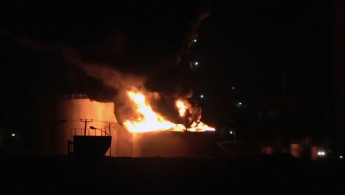Refinery blaze in Yemen's Aden 'sabotage': official
The fire, which also spread to a nearby pipeline, was likely "the result of an explosion (and) probably a deliberate act of sabotage", said the official, who did not wish to be named.
He did not specify who may have been responsible.
"The fire brigade are working to contain the blaze and stop it spreading to the neighbouring storage tanks, which are full of oil and diesel" donated by Saudi Arabia, he added at the time.
Another official said security forces had prevented anyone from leaving the site and opened an investigation into the incident.
Early indications suggested "an explosion and an act of sabotage" were to blame, he said.
Yemen's government took up residence in the southern port city of Aden after Houthi rebels ousted it from the capital Sanaa in 2014.
Aden's refinery was damaged in fighting the following year between government and Houthi forces which put it out of operation for more than a year, causing severe fuel shortages and power cuts.
Yemen produced a relatively small amount of oil before its war escalated in 2015 when Saudi Arabia intervened to back the government of President Abedrabbo Mansour Hadi against the Houthis.
Southern Yemen is home to both the government and separatists, both of which were allies until January.
The STC and Hadi have publicly disagreed on the future of Yemen since clashes erupted in Aden in January, when separatists allied with troops trained by the United Arab Emirates seized control of parts of the government bastion of Aden.
The STC, mainly based in Aden province, has since gained traction in its push for self-rule over the past year and regularly denounces the Saudi-backed government as corrupt.
The Yemen war has triggered what the UN calls the world's largest single humanitarian crisis, with more than three-quarters of the population in need of aid and 8.4 million people at risk of famine.
Nearly 10 million people are just one step away from famine, UN aid chief Mark Lowcock told the Security Council.
"Millions of Yemenis are hungrier, sicker and more vulnerable than a year ago," said Lowcock, who stressed that while the political process was important "it does not in itself feed a single starving child."
The Security Council is considering the creation of a new observer mission to Yemen to monitor the ceasefire in Hodeida, oversee the pullback of forces and allow the delivery of humanitarian aid.
UN Secretary-General Antonio Guterres has proposed the deployment of up to 75 observers to Yemen for an initial period of six months to shore up the ceasefire while talks on a broader peace deal are held.
Follow us on Twitter: @The_NewArab





 Follow the Middle East's top stories in English at The New Arab on Google News
Follow the Middle East's top stories in English at The New Arab on Google News
![The UAE is widely suspected of arming the RSF militia [Getty]](/sites/default/files/styles/image_330x185/public/2024-11/GettyImages-472529908.jpg?h=69f2b9d0&itok=Yauw3YTG)
![Netanyahu furiously denounced the ICC [Getty]](/sites/default/files/styles/image_330x185/public/2024-11/GettyImages-2169352575.jpg?h=199d8c1f&itok=-vRiruf5)
![Both Hamas and the Palestinian Authority welcomed the ICC arrest warrants [Getty]](/sites/default/files/styles/image_330x185/public/2024-11/GettyImages-2178351173.jpg?h=199d8c1f&itok=TV858iVg)